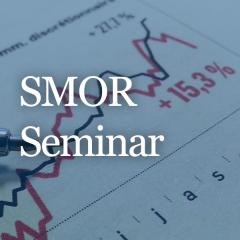Turbulence and fishing influence size-abundance scaling relationships in the aquatic biosphere
Speakers: Professor Jim Mitchell and Jody McKerral (Flinders University)
The scaling relationship between organism body size and abundance is a fundamental ecological phenomenon that links individual-level traits to population-level dynamics. We considered this scaling relationship across the aquatic biosphere by comparing size and abundance data for organisms ranging from viruses to blue whales. The resultant size-spectrum was characterized by a clear discontinuity, where two discrete scaling regions, distinguished by significantly different exponents, occurred. This break in the scaling relationship coincided with the transition point between smaller planktonic and benthic invertebrates and the larger vertebrates comprising the nekton. In response to this demarcation of the community, we considered the role of two independent processes in generating the break in the scaling relationship. First, we demonstrate that the disproportionate loss of large organisms due to human fishing practices has affected the aquatic size-spectra by creating a step in the scaling relationship. Next we demonstrate that the influence of aquatic turbulence also alters the scaling relationship by steepening the slope of the size-spectra incorporating the nekton. The rationale behind this effect is that large swimming animals must divert energy from growth and reproduction to search for resources continually dispersed by turbulence. This subsequently places a restriction on the relative abundance of these organisms. After accounting for the effects of aquatic turbulence and fishing, a cohesive size-abundance scaling relationship, featuring a single exponent value comparable to those typically observed in terrestrial environments, was generated. We then present a Rosenzweig-Macarthur predator-prey model which incorporates the impact of turbulence on size-abundance scaling, and show how Gröbner Bases, a novel method in ecology, can be used to investigate parameter sensitivity and dynamical properties in such systems. We subsequently argue that the combined effects of these unrelated physical and anthropogenic processes operate to influence ecological scaling relationships throughout the aquatic biosphere.
About Statistics, modelling and operations research seminars
Students, staff and visitors to UQ are welcome to attend our regular seminars.
The events are jointly run by our Operations research and Statistics and probability research groups.
The Statistics, modelling and operations research (SMOR) Seminar series seeks to celebrate and disseminate research and developments across the broad spectrum of quantitative sciences. The SMOR series provides a platform for communication of both theoretical and practical developments, as well as interdisciplinary topics relating to applied mathematics and statistics.

